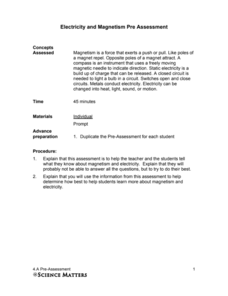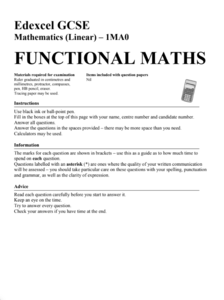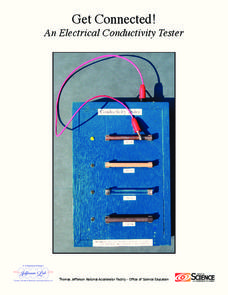Science Matters
Electricity and Magnetism Pre-Assessment
How much do your classes know about electricity and magnetism? A complete elementary unit on the topic begins with a pre-assessment to gauge their understanding prior to instruction. Items include questions about the properties of...
California State Parks
A Teaching Unit on Electricity
It's the invisible energy most people take for granted. Explore the properties of electricity in a complete three-week unit. Learners first manipulate circuits, then experiment with electromagnetism, and finally discover different...
Utah Education Network (UEN)
Utah Open Textbook: 5th Grade Science
How do Earth's changes affect humans? Pupils learn about physical and chemical changes on Earth and how they lead to erosion, earthquakes, and volcanoes. Using the text, they also explore the concepts of electricity and magnetism by...
Purdue University
Light – Just Right!
What does it mean to be resistant to electricity? Scholars answer the question in a six-part STEM activity on electricity. They begin by assessing the conductivity of several different materials and progress to designing their own...
Purdue University
Design of a Door Alarm
How does electricity work? Budding scientists explore the concepts of electrical currents and open and closed circuits with class discussion and a hands-on activity using a battery to turn on a light bulb. Learners also make predictions...
DiscoverE
Design a Wind Turbine
Discover the power of wind energy. Learners design, build, and test wind blades in a hands-on experiment. They analyze the results to determine if they can make any improvements before gathering as a class to discuss their designs.
College Board
2002 AP® Environmental Science Free-Response Questions
Are electric motors all they're cracked up to be? Scholars take a stance and use their knowledge to discuss the benefits and disadvantages of the motor as the first question in a series of four. The questions that follow ask about other...
College Board
2004 AP® Environmental Science Free-Response Questions
Radioactive isotopes have a wealth of uses, but their waste may cause some concern. One of four free-response questions challenges learners to devise a waste removal strategy for medical radioactive substances. Other questions address...
Mathed Up!
Functional Maths Questions
Dang, it's a word problem! Pupils address a variety of word problems that involve knowledge of proportions and geometric topics. The General Certificate of Secondary Education review problems require determining costs based on area...
Mathed Up!
Utility Bills
What is the total cost? Provided with seven problems, pupils determine the total cost for utilities. Scholars determine the amount of the utility used and determine the cost based upon the given unit rate. The resource is part of a prep...
Magic of Physics
Solar Panel
Solar panels are everywhere! How do they work? Energize the class with an interactive that explains the magic of solar energy. The simple click-through demonstration shows how photons are captured and converted to a usable source of...
Magic of Physics
Electric Circuits
Teaching about circuits can be as easy as flipping a switch! Science scholars explore the world of electricity using a fun interactive. The resource uses drag-and-drop images to promote an understanding of circuit components, types of...
Essential Energy
Being a Safety Star (Stage 3)
A spark of static electricity contains up to 3,000 volts, while a lightning strike contains around 3,000,000 volts. To understand electricity, its power, and the safety considerations relating to it learners engage in a comprehensive...
Physics Classroom
Resistance Ranking Tasks
Resistance is not futile ... it is voltage divided by current. Scholars apply their knowledge to a series of ranking puzzles. First, they consider wires of varying lengths and then wires of varying cross-sectional areas. Finally, they...
US Department of Energy
Get Connected!—An Electrical Conductivity Tester
Pupils test various materials to learn if the materials are conductors or insulators. They observe a small electric charge go through, or not go through, a material to light up a small bulb.
Kenan Fellows
Electricity: Sources, Usage, Challenges, and the Future
What does the future of energy look like? Junior engineers collaborate to discover a solution to the global energy crisis during a very hands-on lesson. The unit focuses on learning through collaboration to develop a deep understanding...
Teach Engineering
Exploring Energy: Energy Conversion
The energy is not really lost, it is just converted to a different form. Pupils learn about the conversion of energy in the fifth segment of an energy unit with six parts. Learners develop an understanding of the conservation of energy...
DiscoverE
Oranges and Batteries
Orange you glad you can make circuits using fruit? Young electricians learn about electric circuits and electricity. As part of the activity, they build a circuit with an orange and then with a banana.
DiscoverE
First You See It, Then You Hear It
Light and sound go hand in hand. Pupils set up a system that will emit sound when a laser is directed at a photodiode. Various objects, such as a comb and talcum powder, allow for modulation of the laser beam. Individuals also...
DiscoverE
The Power of Graphene
When you think electric circuits, your pencil probably isn't the thing that comes to mind. A simple experiment lets learners test whether the graphene in pencil lead is a conductor or an insulator. If the LED bulb lights up, a conductor...
New Jersey Historical Commission and New Jersey Council for the Humanities
Thomas Edison: The Wizard of Menlo Park
What would change in your daily life due to a power outage? Here, learners explore the inventions brought to us by the one and only, Thomas Edison, and imagine a day without them. Scholars take part in a grand conversation and write a...
DiscoverE
Design a Folding Solar Panel
Solar energy is an amazing alternative ... but, not always particularly portable! Challenge young scientists to a folding solar panel build-off with an easy-to-execute activity. Scholars brainstorm around specific design needs, construct...
DiscoverE
Hidden Alarm
It's time to wake up! Young engineers build an electric circuit that will activate an alarm. The use of switches in the circuit is a must—because you don't want the alarm to keep beeping forever!
DiscoverE
Electrical Liquids
Liquid or not, here comes the electricity. Scholars test the conductivity of various substances using a circuit that includes a light bulb. If the light bulb lights up, then the liquid is a conductor. What a bright idea!

























